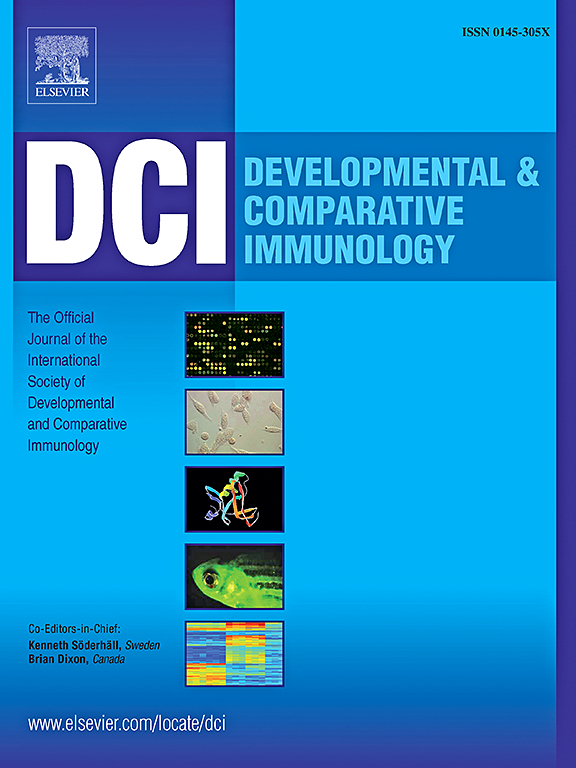A big anti-lipopolysaccharide factor showing sexual dimorphism is involved in anti-WSSV immunity in crayfish
IF 2.4
3区 农林科学
Q1 FISHERIES
引用次数: 0
Abstract
Anti-lipopolysaccharide factor (ALF) is an important active substance in crustacean innate immunity with broad-spectrum antimicrobial and antiviral effects. In this study, we identified a big ALF from Procambarus clarkii, named PcbALF. The full-length cDNAs of two PcbALF isoforms (PcbALF1 and PcbALF2) were 2619 bp and 2142 bp with an open reading frame of 1074 bp and 1317 bp that encodes 357 and 438 amino acids, respectively. Intron retention of PcbALF1 resulted in the loss of the DUF3254 domain. PcbALF1 and PcbALF2 were widely distributed in multiple tissues and their expression in different tissues exhibits sexual dimorphism. Further study found that PcbALF2 expression levels were up-regulated in the intestine and gills of male and female P. clarkii after stimulation with white spot syndrome virus (WSSV) from 0 to 48 h. Furthermore, RNA interference analysis showed that the knockdown of PcbALF2 inhibited PcbALF2 transcription and promoted VP28 expression during WSSV infection. Injection of rPcbALF with DUF3254 domain suppressed VP28 expression, suggesting that PcbALF has a negative role in WSSV replication. Our study shows that PcbALF is involved in anti-WSSV immunity in P. clarkii and exhibits sexual dimorphism.
一种具有两性二态性的大抗脂多糖因子参与了小龙虾抗wssv免疫
抗脂多糖因子(anti - lipopolaccharfactor, ALF)是甲壳类动物先天免疫中的重要活性物质,具有广谱抗菌和抗病毒作用。在本研究中,我们从克氏原螯虾中鉴定出一个大的ALF,命名为PcbALF。PcbALF亚型PcbALF1和PcbALF2的cdna全长分别为2619 bp和2142 bp,开放阅读框分别为1074 bp和1317 bp,分别编码357和438个氨基酸。PcbALF1的内含子保留导致DUF3254结构域的丢失。PcbALF1和PcbALF2广泛分布于多种组织中,其在不同组织中的表达呈现两性二态性。进一步研究发现,在白斑综合征病毒(white spot syndrome virus, WSSV)刺激后0 ~ 48 h,雄性和雌性克氏疟原虫的肠道和鳃中PcbALF2的表达水平上调。RNA干扰分析表明,PcbALF2的敲低抑制了PcbALF2的转录,促进了VP28的表达。注射DUF3254结构域的rPcbALF抑制VP28的表达,提示PcbALF在WSSV复制中具有负向作用。我们的研究表明PcbALF参与了克氏疟原虫的抗wssv免疫,并表现出性别二态性。
本文章由计算机程序翻译,如有差异,请以英文原文为准。
求助全文
约1分钟内获得全文
求助全文
来源期刊
CiteScore
6.20
自引率
6.90%
发文量
206
审稿时长
49 days
期刊介绍:
Developmental and Comparative Immunology (DCI) is an international journal that publishes articles describing original research in all areas of immunology, including comparative aspects of immunity and the evolution and development of the immune system. Manuscripts describing studies of immune systems in both vertebrates and invertebrates are welcome. All levels of immunological investigations are appropriate: organismal, cellular, biochemical and molecular genetics, extending to such fields as aging of the immune system, interaction between the immune and neuroendocrine system and intestinal immunity.

 求助内容:
求助内容: 应助结果提醒方式:
应助结果提醒方式:


